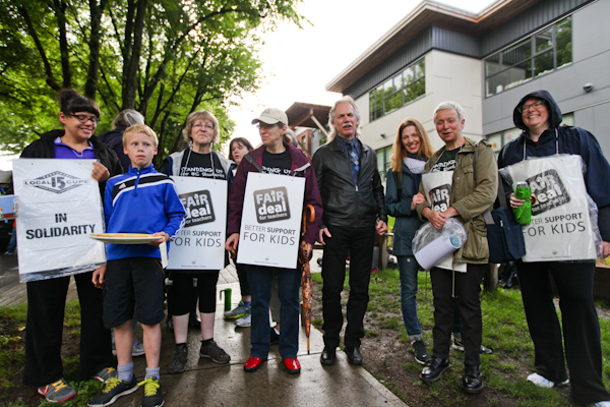Successful unionization drives targeting corporate employers like Amazon and Starbucks have been big news in 2022.
But much larger scale collective action in the Canadian public sector — and in British Columbia — may also be in the cards.
In May, the Public Service Alliance of Canada — the country’s largest federal union — walked away from contract negotiations. In B.C., almost 95 per cent of the BC General Employees’ Union backed a strike vote this month after negotiations broke down over cost-of-living adjustments and wage protection from inflation.
It is not only workers in B.C.’s public sector who voted to take job action in recent weeks — the transit and transportation sectors face possible strikes by truck drivers at the Port of Vancouver and drivers and other bus company workers in West Vancouver.
And in addition to the approximately 33,000 BCGEU members covered by the recent strike vote, more than 350,000 public sector workers have agreements that expired or will expire in coming months.
The BC Teachers’ Federation contract expired June 30 and BC Nurses’ Union members have been working without a contract since March, with bargaining delayed to the fall.
In other words, B.C. could be on the cusp of a major period of labour unrest, similar to what we are seeing in other parts of the world like the United Kingdom. If the labour movement in Canada can mobilize working people who are seeing and feeling how corporations have profited from the pandemic while ordinary people have paid the price, the change could be significant.
Why are workers striking?
Statistics Canada announced a rise in consumer inflation to 8.1 per cent in June. Skyrocketing inflation is the major cause behind worker unrest and collective action.
The main driver of inflation is the price of gasoline, but even excluding gas the consumer price index rose 6.5 per cent in June. Hourly wages, on the other hand, only increased 5.2 per cent.
The below-inflation increase in wages comes despite a record low unemployment rate of 4.2 per cent. A tight labour market is not resulting in above-inflation wage increases for most workers. Nor is there evidence of a wage-price spiral, which is when wage growth drives price increases, which in turn drives wage growth in the economy.
Instead, corporate profits, global price increases, supply chain issues and global profits are making consumer goods more expensive, while wages fail to keep pace.
But average wages and prices also mask variations in sector-specific pay increases, and its impacts on different groups of workers. The June Labour Force Survey showed differences between the wage growth of unionized versus non-unionized employees nationally: the hourly wages of all workers with union coverage were up 3.7 per cent, compared with 6.1 per cent among non-unionized workers.
Why are unionized workers falling behind?
Recent research by the Canadian Centre for Policy Alternatives analyzed trends in wages and inflation in Canada from 2020-22 and found that three of the four sectors with the lowest wage gains were public administration, education and health care.
The report found that several provincial governments, including Manitoba, Saskatchewan, Alberta and Newfoundland and Labrador, were working to freeze those wages before and even during the pandemic. In B.C., despite a two-per-cent average annual increase in public sector wage settlements, the average public sector worker will take an effective 1.5-per-cent pay cut this year.
This means that workers in some of the sectors most impacted by the pandemic, like health care, have gained the least from the recent economic recovery. Lower paid workers, such as care aides or educational assistants, also feel the impacts of inflation more acutely because they have to spend more of their income on necessities like food and shelter.
As economist Alex Hemingway has argued in his analysis of B.C.’s public finances, the province can afford to pay its essential public sector workers much more.
Nor are wages the only issue.
Stephanie Smith, president of the BCGEU, told me the union wants the government to address issues made worse by the COVID-19 pandemic: occupational health and safety, especially mental health and stress; understaffing and excessive workloads; and workforce planning to recruit and retain workers in key services.
There appears to be a strong appetite among union members to act collectively to demand better wages and working conditions.
The changing politics of labour
Economic historian Adam Tooze, who has analyzed normal drivers of inflation in the U.S. and Europe from 1979-2019 and recent ones from 2020-21, notes that the historical role of wages and corporate profits in driving inflation is now reversed. He found that wages have accounted for less than eight per cent of U.S. price increases since 2020, compared to corporate profits which accounted for almost 54 per cent.
A similar trend is seen in Canada. Workers understand that the cost of living is going up while their wages aren’t keeping pace. Moreover, when central banks raise interest rates to quell inflation, it hurts employment and wages and makes life even more expensive for those with debt.
After years of declining unionization and little labour unrest, are we seeing a change in the politics of labour in B.C. and Canada? It’s too early to tell.
Tooze argues that the low-inflation environment of the last several decades is both a driver and a result of unequal class power. Governments and corporations have been promoting monetary policy that hurts workers and unions with little risk of retaliation.
While the balance of social power has not shifted dramatically, the upsurge in worker organizing and policy proposals for increased corporate taxes could signal a change.
In the meantime, BCGEU members appear committed to strike action to get a fair contract that stops their wages falling farther behind.![]()
![]()
Read more: Rights + Justice, Labour + Industry
















Tyee Commenting Guidelines
Comments that violate guidelines risk being deleted, and violations may result in a temporary or permanent user ban. Maintain the spirit of good conversation to stay in the discussion.
*Please note The Tyee is not a forum for spreading misinformation about COVID-19, denying its existence or minimizing its risk to public health.
Do:
Do not: